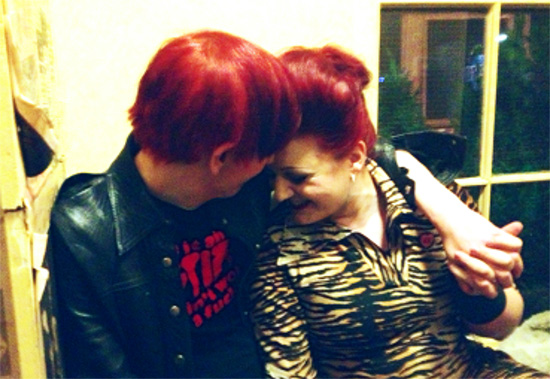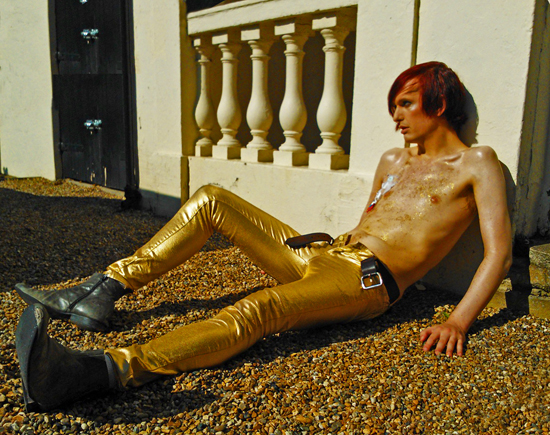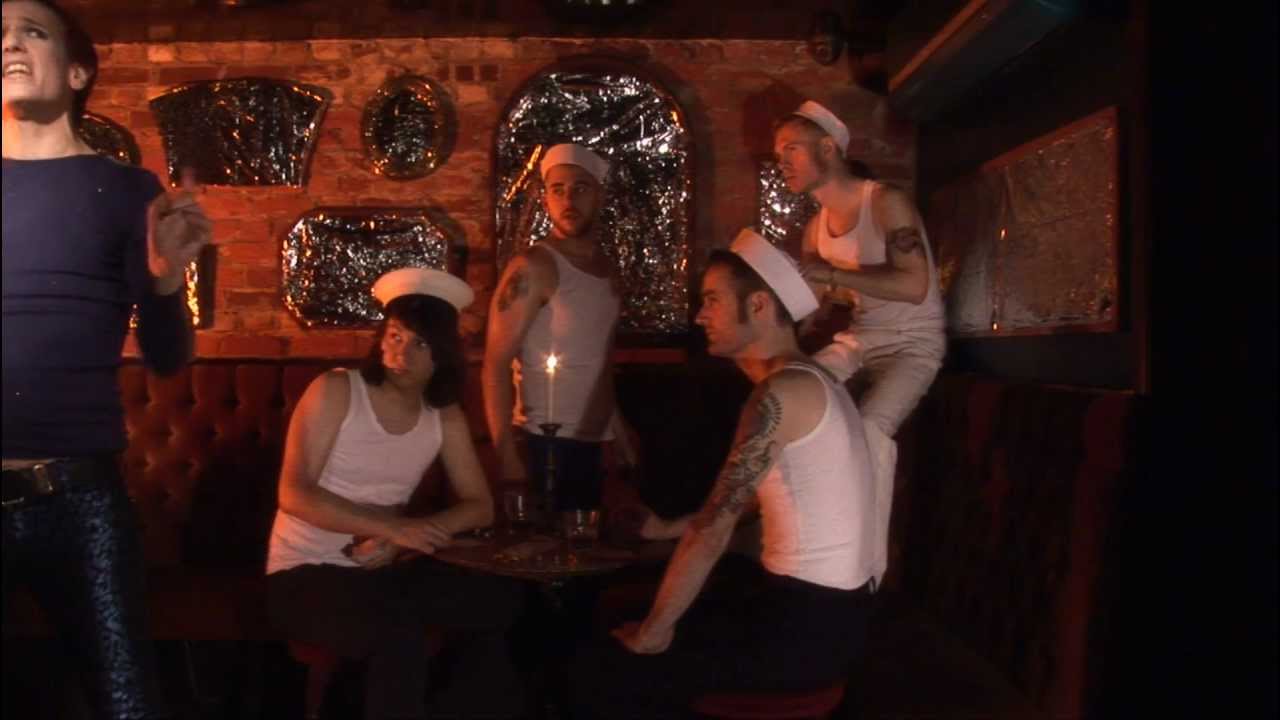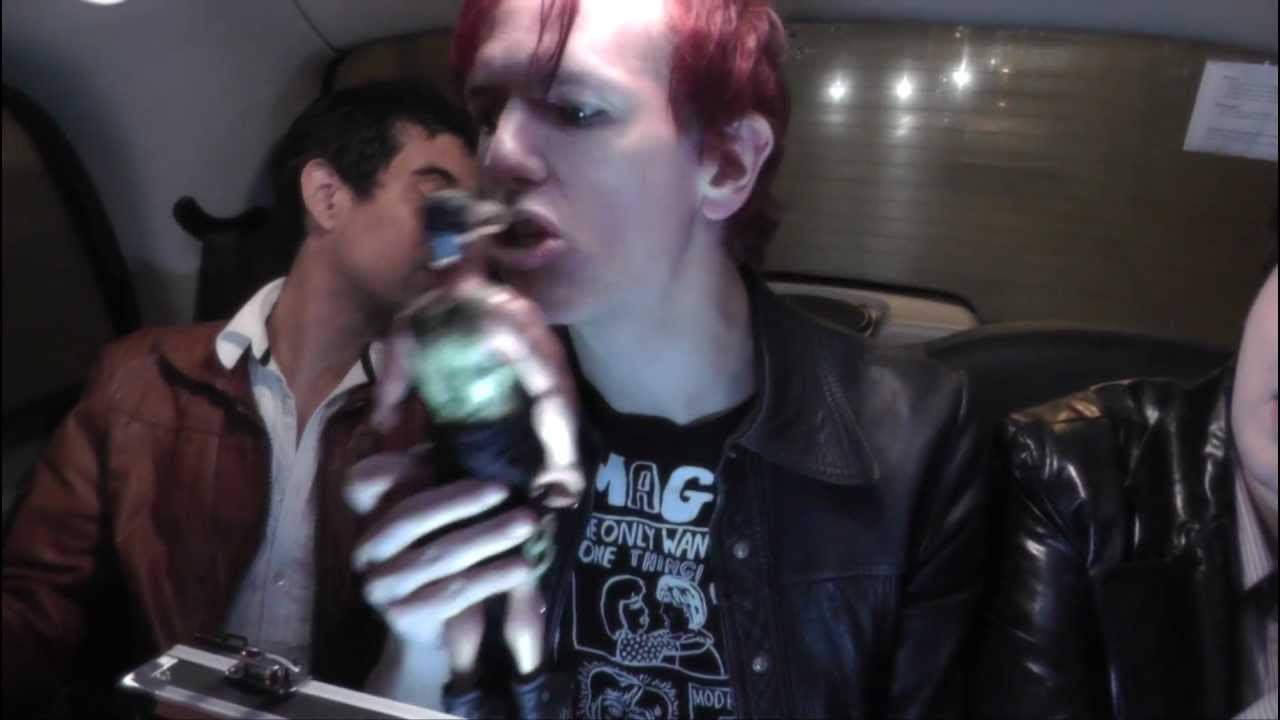Photographs courtesy of Nikki Q and Heidi Heelz
When I walk in to the bar, Jonny Cola is finishing his dinner. A shock of red hair, leather jacket over his slight frame and glitter around his eyes. He looks every inch the rock star. There is very little to suggest that six months previously he was in a hospital bed, suffering from end stage kidney failure.
In March 2012 Jonny Cola and The A Grades had released their debut EP Halo to critical acclaim and he was in the midst of organising his marriage to girlfriend and Glam Racket DJ, Heidi Heelz.
Life was sweet.
One phone call changed all that though, and if it wasn’t for his fiancé stepping forward as a living donor things would have been very different. Over the space of a year, their lives have changed dramatically, but out of it has came a new resolve and some great music. The new songs are full of renewed vibrancy and among other things, contain several love letters to London. This is glam pop at its best.
The A Grades are busy working on their debut album In Debt due for release later this year. On the eve of the release of double A-side ‘Straight To Video’/ ‘Marlborough Road’ [April 3, via Scratchy Records] I talk to both Jonny and Heidi about their lives: the testing times they have been through, being tied to chairs by sailors and writing utterly filthy music.
How did you two meet?
Heidi Heelz: We met in March 2011 when I booked Jonny’s band to play the Glam Racket club.
What were your first impressions of each other when you met?
HH: I thought Jonny was a sweetie.
Jonny Cola: I thought Heidi was a very nice, organised promoter who actually showed an interest in the band, which is quite rare on the London circuit.
Did you have a mutual appreciation of each other’s music?
HH: I was in a tribute band called Proxy Music at the time, and you (Jonny) loved Proxy Music. I listened to Jonny’s music and thought they would go down well at Glam Racket, which they did. And I got a boyfriend out of it to boot.
So moving forward with Jonny Cola and The A Grades… The EP comes out, you have plans to get married, life is good. Then you get the phone call about your kidney failure. A bolt out of the blue…
JC: [Laughs] I thought, ‘Oh my fucking Christ. I thought this was just a wheat intolerance!’ This was a phone call you never expect to get.
How long did it take to get diagnosed?
HH: 24 hours. We had no idea it was going to be kidney failure.
JC: I was expecting to be diagnosed as coeliac.
HH: He was dangerously shot and he was in danger of having a stroke.
When the doctors spoke to you, what was the news?
JC: A doctor eventually saw me. She tried to prepare me and I was given a booklet with the general literature about kidney disease. Kidney disease doesn’t get better, it gradually deteriorates.
So you didn’t think you were desperately ill previously?
HH: He was still going to work, getting drunk and playing gigs.
Did they think they’d find a donor?
JC: Deceased donors are listed on the National Register and can take three years which is the average waiting time. It very much depends on a match coming up. With living donors, you have to find someone who is prepared to do it, who is a suitable match and in good health.
Heidi, How did they find out you could be a donor?
HH: The doctor said Jonny would need a new kidney sooner rather than later. I told her I wanted to have the tests and see if I was suitable.
When Heidi offered her kidney, what was your response? Did you try and talk her out of it or was it, ‘Thank you, you’ve just saved my life’?
HH: He said, you shouldn’t have to do that for me! I had an intuitive feeling that was the way it was going to happen. Plenty of other people were tested but I knew it was going to be me.
JC: You expect someone with a genetic link to have a better chance of being a match. However, Heidi had already been tested so we decided to go ahead.
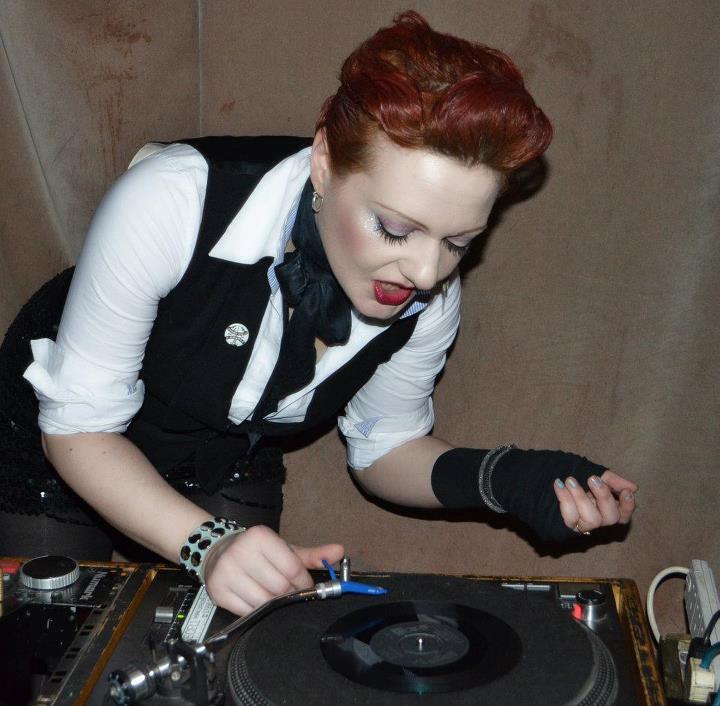
How long did the process take?
HH: He was diagnosed on April 5 and the operation was on November 27.
Was it a long operation?
HH: Three hours for me and two hours for him.
Heidi, what has recovery been like?
HH: I had a rough old time. I had to go back in because one of my lungs had collapsed during surgery, which they didn’t tell me about! We were given huge amounts of analgesics and spent Christmas and New Year on loads of opioids. The anti-sickness medicine they gave me in hospital was fun. The first time they gave it to me I was giggling away [laughs] and coming out with random anecdotes. If I got bored in hospital I’d tell them I was sick and get them to give me the shot. It passed the time.
JC: I remember this withdrawal night when they took her off it. It was like that scene out of Trainspotting [laughs] where the baby crawls across the ceiling. That’s how it felt in this little booth of claustrophobic, sweating and cold. I couldn’t get comfortable and felt utterly trapped. It was horrendous.
Johnny, What was your recovery like?
JC: I think I had it much easier than Heidi. I was off painkillers within three weeks but I’m on a lot of other medication which has side-effects. I had some rejection four days after the operation so I was on steroids.
Are you out of danger now?
HH: I’m fine.
JC: I’m never out of danger because the donor kidney doesn’t last forever. The average life expectancy of a kidney is about 15 years. A lot of people have a transplant when they’re older. I’m quite young to be in this position.
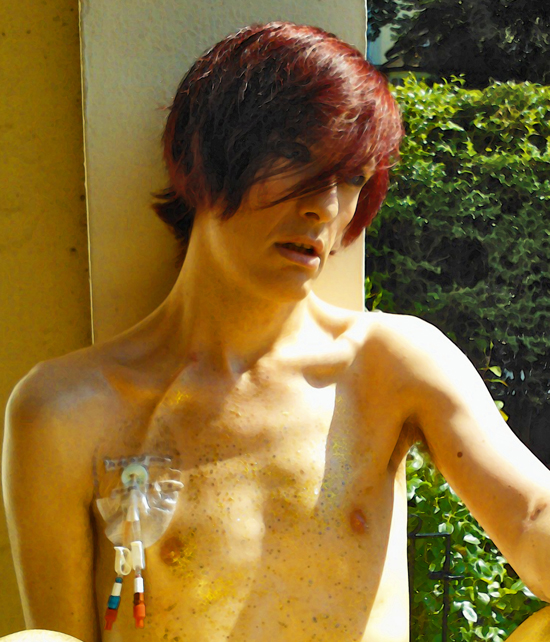
How has the last year impacted your music?
HH: I gave it all up temporarily so that I could look after Jonny. I’m now embarking on a new club night and I’ve joined The Pricscillas on bass. The hiatus is finished which is pretty good.
JC: My first thought was, “Oh my God, the band is totally fucked!” We were supposed to be playing a couple of dates in the West Midlands on the day I was diagnosed. I was in hospital so we had to cancel those dates. Once we explained we weren’t going to do any of those gigs, it felt quite emotional. A lot of people knew what had happened but we carried on doing a few [other] gigs.
Did you find the music was a form of therapy?
JC: The worst thing would have been if I’d just stopped doing it. It would have been like a large chunk of my life had gone just like that, which would have been awful.
Were you doing any writing when you could?
JC: I was actually talking about this with somebody earlier. When I’m writing I find it very difficult to write about things that are actually happening at that moment in time. I write much better when I write about things that are emotionally resolved; when there’s a bit of distance to it. So what actually happened was that I just started writing loads about sex, most of the songs that I wrote last year were…
HH: Filth.
JC: Pretty filthy yeah, which means that the album when it comes out, hopefully in the summer, is basically full of filth. People will be expecting these heart-wrenching songs about mortality, it is about mortality in a way, I mean there is one, but even that’s filth… The desire is heightened when the body is weak.
HH: It’s the age-old connection of sex and death as well, sex and death go hand in hand… in the face of your own mortality.
JC: You know I couldn’t rule it [death] out, we couldn’t rule it out, we knew that it was pretty unlikely once it had been picked up but we weren’t going to doubt that, had it not been picked up, then there was a very real chance that I could have just keeled over.
HH: Yeah, a kind of dead by summer sort of thing.
What were the stories behind the two songs ‘Straight To Video’ and ‘Marlborough Road’ Did you mean to interlink the two?
HH: We totally meant to.
JC: Three of us directed it collectively. Jezz – one of our guitarists – and I did about three videos for the band before Heidi got involved with the ‘Halo’ video.
HH: I came on board and did the choreography and costumes for the girls in ‘Halo’.
JC: The three of us working together produced really good results. I thought we should do an extra double A-side. Because of all this stuff going on we couldn’t go straight to the album.
HH: We were spending a lot of time at home and started cooking up ideas for the videos to distract ourselves.
JC: We got the bare bones of the ideas together, at which point they were two separate videos. At that point, the ‘Straight To Video’ was more fully realised than the ‘Marlborough Road’ video.
HH: We watched a brilliant film called Querelle and thought it would be lovely to do something along those lines.
I’m curious, what was the tying to the chair about in ‘Straight To Video’?
JC: I just wanted to be tied up and have my top ripped off by sailors, and I said ‘Can we organize this Heidi?’ [laughs]
To me the videos are almost love letters to London.
HH: Marlborough Road definitely.
JC: I think that sort of core idea of the journey from North to South was my initial basic thing that I had for that bit.
HH: Yeah and a list of the places that you wanted featured because they’re all pretty significant.
JC: I lived on Marlborough Road, the song is not really hard for anyone that knows me to know that’s what it’s about. I used to live on Marlborough Road, Archway and we now live in Camberwell. It is where the journey ends up so it covers a sort of North to South movement and I think I just liked videos which reflect this. I think there’s something quite dull about a video which ends and it hasn’t really got anywhere from where it starts.
What do you want the viewers to take away from the video?
HH: We wanted people to get involved. I made props for the videos and I was hoping people get what we were hinting at and pushing towards.
JC: Any video has to work with the song as well. The lyrics are about feeling trapped and enclosed. I wanted to get across a slightly paranoid feeling.
JC: The song opens up with the guitar solo in the middle and becomes more expansive. It felt natural to have that sort of panoramic shot.
What are your influences?
J: A little bit of the Bowie thing is just geography. I grew up in suburban South London. My natural speaking voice and my singing voice is not going to be dissimilar. I certainly didn’t set out to emulate him, but if someone compares you to Bowie in any kind of positive way, it’s massively flattering.
Who did you listen to as teenagers?
JC: In my early teenage years it was PWL and Kyle. Erasure were the first band I was really into. I don’t think I ever just liked one kind of music because that basically means you don’t like music. I went from synth pop to commercial dance, a lot of the early 90s chart techno stuff and some less charty stuff.
Ministry of Sound type stuff?
JC: To a degree. I caught the back end of the Manchester thing. I bought a lot of Brit Pop which is outdated in the same way a lot of music which is made for a particular moment in time is. 70s Glam doesn’t seem dated though. I was, and still am, into Saint Etienne. Their most interesting stuff tends to be weird B-sides and strange unreleased tracks. Their covers of ‘Everything Flows’ and ‘I’m Too Sexy’ are sensational.
HH: I fell in love with the early 70s from the age of 12. Bowie, Roxy, Iggy, Velvet Underground, Eno. I was in this time capsule throughout my teenage years and refused to believe that it was in the 90s. I stuck my head over the parapet for Pulp and Suede, but that’s about it. There were plenty of modern bands I liked but I tended to be slightly stuck in the 70s.
JC: The worst thing about music at the moment is that there are good bands and artists out there, but they never seem to get anywhere. Late 90s bands such as Super Fury Animals released some amazing pop singles. There just isn’t the opening for [that kind of music] now because the indies are so small and indie-minded. The vast majority of record labels are into narrow little genres and wilfully obscurantist in their approach. You’ve got this huge gulf between that and the mainstream which isn’t interested. There are good artists and bands and they’re not getting listened to.
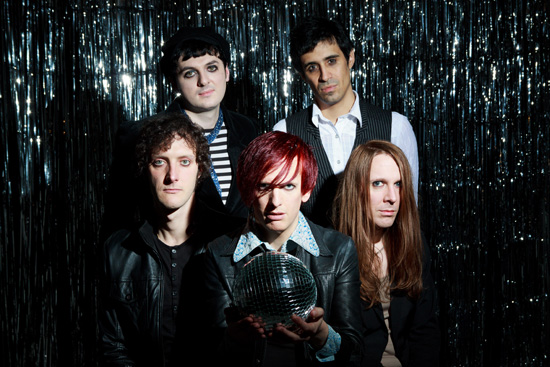
Anyone you can think of?
HH: West Coast Californian stuff, Big Tits for example. [The Quietus: performing ill-advised Google searches so you don’t have to, Ed]
JC: Every time I buy into a band at the moment they’re in bloody California! It feels like everyone’s trying to out-obscure everyone else.
How is the new album In Debt going?
JC: It’s coming together. We did a certain amount of recording before the operation.
HH: It was good that we concentrated on doing all the shoots for the video. We didn’t have time to really worry about the major surgery.
JC: We’re going to be starting the final tracks for the album in the next few weeks and finishing off the ones that we have started. I’m hoping it should be out sometime this summer.
Are you feeling good now?
JC: I’m fucking knackered now. But it is fantastic to be back doing it. I can’t wait to be out there and I’m so looking forward to playing.
Are you both feeling positive about the future?
HH: Absolutely. Relieved I think.
JC: Extremely positive. Once you’ve dealt with something like this you can deal with anything.
HH: If a relationship can survive this it can survive anything. If it’s possible we became closer through this. We were pretty damn close already but yeah. It’s amazing.
Jonny Cola and the A-Grades’ ‘Straight To Video’ / ‘Marlborough Road’ is out today. They play Brixton Windmill on Wednesday April 10
